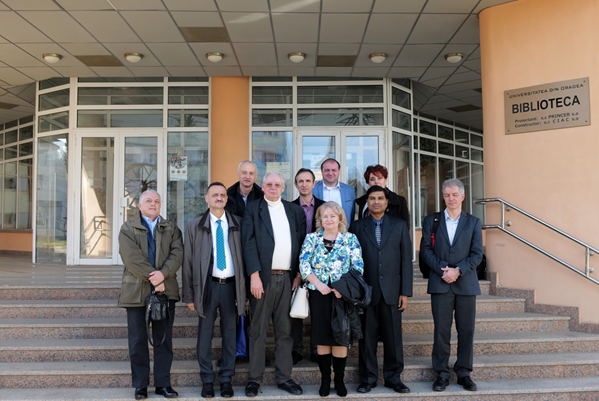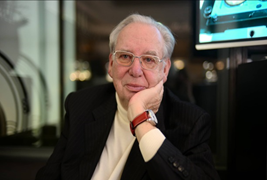NEXT GENERATION NETWORKS:SOFTWARE DEFINED RADIO, AND EMERGING TRENDS
NEXT GENERATION NETWORKS:SOFTWARE DEFINED RADIO, AND EMERGING TRENDS
Oradea, Romania, February 17, 2020

The workshop took place on February 17, 2020 at the University of Oradea Romania with the participation of Prof. Ulrich L. Rohde, IEEE Life Fellow and Prof. Ajay K. Poddar, IEEE AP-S Chapter Activities Chair,Prof.PhD.Eng. Alexandru Marius Silaghi – Faculty of Electrical Engineering and Information Technology, University of Oradea, Prof.PhD.Eng. Helga Silaghi – Faculty of Electrical Engineering and Information Technology, University of Oradea, Prof.PhD.Eng. Gabriela Tont – Faculty of Electrical Engineering and Information Technology, University of Oradea, Assoc.Prof.PhD.Eng. Ovidiu Novac – Faculty of Electrical Engineering and Information Technology, University of Oradea, Lecturer PhD.Eng. Claudiu Costea – Faculty of Electrical Engineering and Information Technology, University of Oradea, Lecturer PhD.Eng. Sorin Popa – Faculty of Electrical Engineering and Information Technology, University of Oradea, Ioan Cristea – Europe, Asia and Oceania Continental Technical Representative, Broadcasting World Family Radio Maria, Ovidiu Ratiu – General Manager Control Data System, Cluj-Napoca.
The term SDR (Software Defined Radio) was coined by author in 1985; first official document disclosed in UK during Classified Session (USA Secret). This was the first public software radio initiatives by US Defense (Ulrich L. Rohde, Digital HF Radio: “A Sampling of Techniques, presented at the Third International Conference on HF Communication Systems and Techniques”, London, England, Feb. 26-28, 1985, Classified Session). The recent security concerns demands an intensive data gathering. The challenge of big data can be addressed by UWB (Ultrawideband) technology implementation on Software Defined Radio (SDR) platforms. A SDR is a radio communication system where components that have been typically implemented in hardware are instead implemented by means of software on an embedded computing device. A fundamental challenge with SDR is how to achieve sufficient computational capacity, in particular for processing ultra wideband high bit rate waveforms, within acceptable size and weight factors, within unit cost, and acceptable power consumption. SDR offers the flexibility between bandwidth and range, the ability to adapt to the environmental parameters and employ optimal wide-band pulse characteristics for channel equalization and robustness, and finally the capability to easily adapt to current communication infrastructures, such as personal computers. The UWB (Ultrawideband) technology implementation is optimized for applications such as detecting unknown signals, identifying interference, spectrum monitoring, spectrum clearance, and signal search over wide frequency ranges, producing signal content and direction finding of identified signals. This talk will show sophisticated digital signal processing implemented in all modern receivers utilizing UWB technology for the applications in IoT (internet of things) and also advantages of SDR processing for radio-monitoring will be explained.
Date and Time
Location
Hosts
Registration
Speakers
 Ulrich Rohde
Ulrich Rohde
NEXT GENERATION NETWORKS:SOFTWARE DEFINED RADIO, AND EMERGING TRENDS
The term SDR (Software Defined Radio) was coined by author in 1985; first official document disclosed in UK during Classified Session (USA Secret). This was the first public software radio initiatives by US Defense (Ulrich L. Rohde, Digital HF Radio: “A Sampling of Techniques, presented at the Third International Conference on HF Communication Systems and Techniques”, London, England, Feb. 26-28, 1985, Classified Session). The recent security concerns demands an intensive data gathering. The challenge of big data can be addressed by UWB (Ultrawideband) technology implementation on Software Defined Radio (SDR) platforms. A SDR is a radio communication system where components that have been typically implemented in hardware are instead implemented by means of software on an embedded computing device. A fundamental challenge with SDR is how to achieve sufficient computational capacity, in particular for processing ultra wideband high bit rate waveforms, within acceptable size and weight factors, within unit cost, and acceptable power consumption. SDR offers the flexibility between bandwidth and range, the ability to adapt to the environmental parameters and employ optimal wide-band pulse characteristics for channel equalization and robustness, and finally the capability to easily adapt to current communication infrastructures, such as personal computers. The UWB (Ultrawideband) technology implementation is optimized for applications such as detecting unknown signals, identifying interference, spectrum monitoring, spectrum clearance, and signal search over wide frequency ranges, producing signal content and direction finding of identified signals. This talk will show sophisticated digital signal processing implemented in all modern receivers utilizing UWB technology for the applications in IoT (internet of things) and also advantages of SDR processing for radio-monitoring will be explained.
Biography:
Prof. Dr.-Ing. habil. Dr. h.c. mult. Ulrich L. Rohde is the Chairman of Synergy Microwave Corp., Paterson, New Jersey; President of Communications Consulting Corporation, serving as an honorary member of the Senate of the Armed Forces University Munich, honorary member of the Senate of the Brandenburg University of Technology Cottbus–Senftenberg, Germany; past member of the Board of Directors of Ansoft Corporation, Pittsburgh, Pennsylvania; and is a partner of Rohde & Schwarz, Munich, Germany. Prior to being appointed permanent Honorary Professor of RF and Microwave Technologies at the University of Cottbus, Dr. Rohde was appointed Visiting Professor of RF and Microwave Technologies in November 2001 at the University of Cottbus, Germany, was member of the staff at George Washington University (1982) and as an adjunct professor at the University of Florida, Gainesville, teaching in the Electrical Engineering and Computer Sciences departments gave numerous lectures worldwide regarding communications theory and digital frequency synthesizers. He is also a full professor at the University of Oradea. Dr. Rohde has published more than 300 scientific papers in professional journals and several books and book chapters, and several dozen patents. Recently appointed as Honorary Professor at the high-ranking prestigious institute IIT Delhi, India.
Dr. Rohde has been named by the Institute of Electrical and Electronics Engineers (IEEE) and received the prestigious IEEE AP-S Distinguish Achievement Award for outstanding career achievement in the field of antennas and propagation, IEEE IFCS W. G . Cady Award for 2017, IEEE MTT Application Award for 2016, IEEE IFCS I.I. Rabi Award for 2015, and more than dozen other awards for his outstanding scientific contributions in 5 decades. The IFCS I.I. Rabi Award recognizes outstanding contributions related to the fields of atomic and molecular frequency standards, and time transfer and dissemination and measurement of resonator structures for implementation in high-performance frequency sources, essential to the determination of atomic resonance. The award’s namesake, physicist Is Idor Isaac Rabi, received the Nobel Prize in 1944 for his discovery of nuclear magnetic resonance, which is used in magnetic resonance imaging. Last year Dr. Rohde was the recipient of another singular 2014 IEEE IFCS honor, the C.B. Sawyer Memorial Award, which recognizes “entrepreneurship or leadership in the frequency control community; or outstanding contributions in the development, production or characterization of resonator materials. Dr. Rohde is the recipient of the prestigious RCA (Radio Club of America) Life time achievement award for 2017. Based on Dr. Rohde’s 5-decade of scientific contribution, IEEE has established 4 awards on his name for the encouragement and motivation of the young engineers and professionals towards advancement of the technology for the humanity.
Dr. Rohde is a member of the following: Fellow Member of the IEEE, Member of the IEEE Technical Committee for HF, VHF, and UHF Technology MTT-17, Member of the IEEE Signal Generation and Frequency Conversion MTT-22, Member of the Board of Trustees Fraunhofer Gesellchaft (EMFT) for Modular Solid State Technology, Member of the Board of Trustees of the Bavarian Academy of Science, and Honorary Member of the Academy of Science, all in Munich, ETA KAPPA NU Honor Society, Executive Association of the Graduate School of Business-Columbia University, New York, The Armed Forces Communications & Electronics Association, Fellow of the Radio Club of America, former Chairman of the Electrical and Computer Engineering Advisory Board at New Jersey Institute of Technology.
His hobbies are sailing, U.S. Merchant Marine Officer, Master of Steam or Motor Vessels, photography and ham radio (N1UL).
Ajay Poddar
IEEE AP-S Chapter Activities Chair
Agenda
Feb 17, 2020:
Arrival to Oradea University at 10:00AM
Introduction by Oradea University Rector and Faculty Staff: 10:30 AM
Talk 1 (Prof. Ulrich L. Rohde): 11:00AM to 1:00 PM
Lunch : 1:00-2:30 PM
Talk 2: (Ajay Poddar) 2:30 PM-3:30 PM


 Add Event to Calendar
Add Event to Calendar